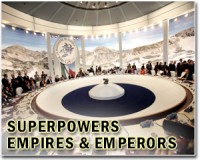| . |  |
. |
Beijing (AFP) March 18, 2010 After running at loggerheads with the West over climate change, human rights and nuclear proliferation, China is now on a collision course with the international community on the value of its currency. Emboldened by its growing power and prosperity, China is striking a more defiant pose on the world stage and becoming less inclined to bow to the demands of the West, analysts say. "Clearly a faction within the Communist leadership believes... it's time for Beijing to impose its own views on the international community," said Valerie Niquet, a researcher at the French Institute for International Relations. Chinese Premier Wen Jiabao even addressed such concerns at his grand once-a-year press conference at the close of the parliament session earlier this month -- before swiftly rejecting them out of hand. "Some say China has become more arrogant and tough, and some are putting forward a theory of "Chinese triumphalism," said Wen. But he declared that the world's most populous nation, which boasts the third-largest economy, remained only at the "primary stage of development" and insisted it would never pose a threat to any other nation. "China is a responsible country. China has called for and taken an active role in international cooperation on economic and political issues in our world," he said. Nevertheless, a newly confident China has been baring sharp fangs in the Year of the Tiger. Beijing is fiercely resisting international pressure to raise the value of the yuan, which has been effectively pegged to the dollar since mid-2008, leading to charges from the West it is kept low to boost Chinese exports. The US Senate upped the ante this week, drafting legislation to punish China if it fails to revalue the currency, while the International Monetary Fund weighed in to the dispute on Wednesday. "The renminbi (yuan) is very much undervalued and it's in the logic of rebalancing (of the world economy) that the renminbi will appreciate," IMF managing director Dominique Strauss-Kahn said. The wrangling over the yuan has added to tensions between Beijing and the administration of President Barack Obama over a host of issues including Internet freedoms, Tibet and US arms sales to Taiwan. Relations between the two powers are now at their lowest ebb for several years. After extending his hand to China at the start of his mandate, "Obama has made a 180-degree about-turn. Now he is only thinking of American interests," said Shi Yinhong, director of the Centre for American Studies at the People's University in Beijing. Both Washington and London have pushed Beijing to agree to tough new sanctions against Iran over its controversial nuclear drive, but China has not budged an inch, repeatedly saying that negotiations are the only answer. London and Beijing have also sparred over the execution in China of a Briton convicted of drugs smuggling despite official pleas for his life to be spared, and other human rights cases. "It's clear that China has hardened its stance -- it's been like this since the Olympic Games in 2008," said Jean-Pierre Cabestan, a China expert who teaches political science at Hong Kong Baptist University. "China feels more powerful and influential on the world stage, the Communist party needs to show its strength... to galvanise the increasing nationalism it has fostered in society," said Cabestan. A poll published in the China Daily on Wednesday -- albeit of barely 2,000 people in a country with a population of 1.3 billion -- found that most Chinese believe their nation is progressing in the right direction. It said most respondents ranked the United States as the number one threat to China's development now and in the next decade, but also described it as the most important country for China both politically and economically. Niquet said China's more strident posture on the world stage became clear at the international climate change conference in Copenhagen, with many in the West pinning the blame on China for the lack of a comprehensive deal. As a result, she said, "the traditional indulgence shown towards the emerging Chinese power has been rolled back". But analysts said they did not believe China was on course for more confrontational relations with the West. "Chinese foreign policy knows how to adapt, to draw back or become flexible if its enemies or its partners are staying tough," said Cabestan.
Share This Article With Planet Earth
Related Links Learn about the Superpowers of the 21st Century at SpaceWar.com Learn about nuclear weapons doctrine and defense at SpaceWar.com
 Outside View: Is U.S. a serious nation?
Outside View: Is U.S. a serious nation?Washington (UPI) Mar 17, 2009 To many, THE issue confronting the United States is a government that is dysfunctional and even badly broken. To others, the immense and swelling fiscal debt and deficits must redressed before the nation slips into bankruptcy. Still others argue that values are the centerpiece of America and unless differences over guns, gays, gestation periods and God can be fixed, the United States is headed ... read more |
|
| The content herein, unless otherwise known to be public domain, are Copyright 1995-2010 - SpaceDaily. AFP and UPI Wire Stories are copyright Agence France-Presse and United Press International. ESA Portal Reports are copyright European Space Agency. All NASA sourced material is public domain. Additional copyrights may apply in whole or part to other bona fide parties. Advertising does not imply endorsement,agreement or approval of any opinions, statements or information provided by SpaceDaily on any Web page published or hosted by SpaceDaily. Privacy Statement |